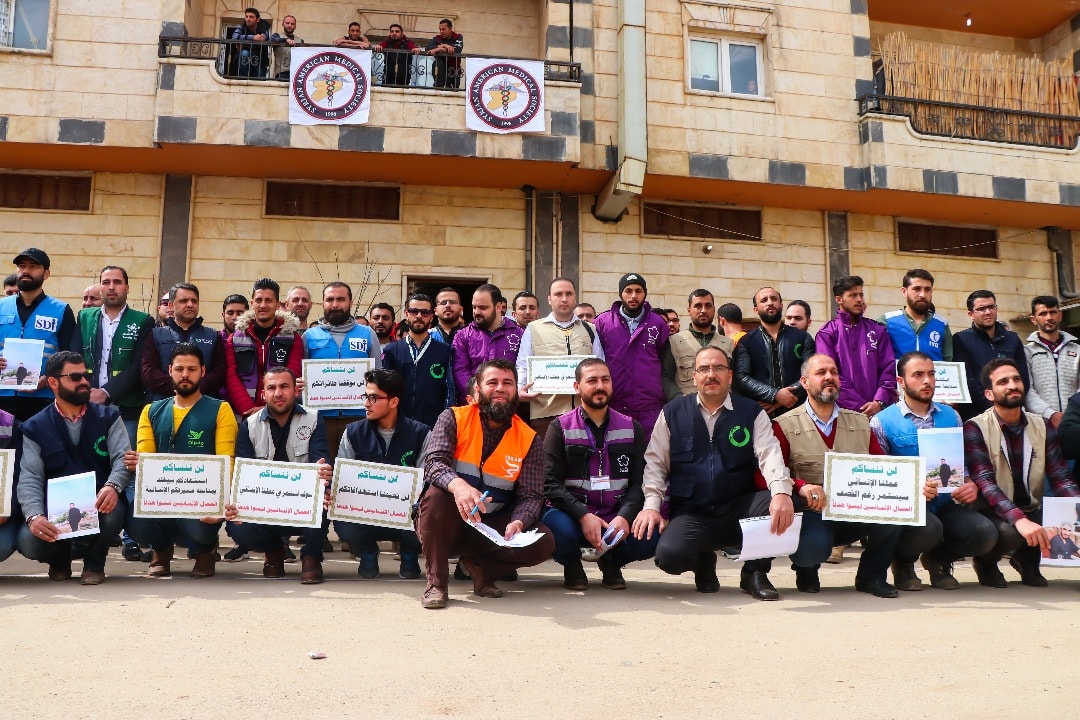Dozens of workers from Syrian relief organizations participated in a solidarity rally on Tuesday, offering condolences for colleagues killed over the past few weeks in the bombing campaigns by Russia, Iran and Assad in Idleb and Aleppo provinces.
The event, held near Bab al-Hawa, north of Idleb, was organized by the Syrian NGO Alliance, and was attended by employees of the various organizations that provide services to the hundreds of thousands of displaced people and provide relief to the victims of the military campaigns in Aleppo and Idleb.
Mohamed Aqil Qanas, Director of the Ihsan Relief and Development office in the Aleppo countryside, delivered an opening speech, expressing his sadness over the killing of relief workers who died while working in Idleb and Aleppo over the past few weeks.
“Relief workers who provide aid to people today need help themselves. Among the Ihsan staff, more than 300 people have been forced to flee with their families. Relief teams continue to be targeted, and today we stand in honor of the lives of our colleagues who were martyred during their work providing assistance to the Syrian people,” he said.
The organizers said that the number of displaced persons over the past 12 months had exceeded 948,000, according to the United Nations, noting that more than 80 percent of them were children and women.
They noted that most displaced families had inadequate shelter or places unfit for habitation, and many could not find a tent, adding that, “The tent has become a dream for many displaced families.”
Relief organizations said that “the deteriorating economic situation in the country threatens Syrians in general and displaced people in particular in terms of securing basic needs for the family,” adding that “humanitarian organizations are doing their best to provide assistance to people, but the need is great and there is an urgent need to support relief projects.”
In addition to the deaths of relief activists in Idleb and Aleppo, hundreds of activists from relief organizations have recently been forced to flee from the areas where they were living and providing their services as a result of the bloody military campaign launched by Russia, Iran and Assad, which intensified last February.
On Feb. 19, 2020,s the Syrian NGO Alliance held a press conference in the Turkish city of Istanbul, aiming to draw the world’s attention to the humanitarian catastrophe facing Idleb and warning the international community of the dire consequences of the military escalation in the province by the regime and its allies.
The press conference came out with a series of messages and warnings after reviewing the humanitarian situation in Idleb, which has been experiencing the worst humanitarian disaster in Syria since 2011.
The conference press release described what was happening in northwestern Syria as “the worst protection crisis”, especially with regards to the displacement of hundreds of thousands of people from their areas, without shelter or the minimum levels of protection.
The statement said more than 900,000 civilians were displaced during the recent military campaign by Assad’s forces, 81 percent of whom were women and children, most of whom were displaced more than three times.
The organizations estimated the funding required to respond to the recent displacement crisis would be about 336 million dollars, of which the United Nations has only 20 percent (70 million dollars), meaning the current amount covers the basic response without being able to cover the integrated humanitarian intervention that displaced people need.
The press conference reviewed, in figures and statistics, the suffering of the displaced people in northern Syria in light of poor weather conditions, pointing out that the current camps are overcrowded given the scarcity of houses, which forced most displaced people to sleep in the open and under trees.
This article was translated and edited by The Syrian Observer. The Syrian Observer has not verified the content of this story. Responsibility for the information and views set out in this article lies entirely with the author.


